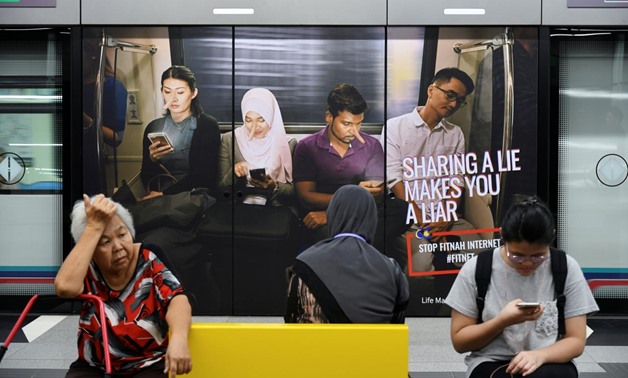
Commuters sit in front of an advertisement discouraging the dissemination of fake news, at a train station in Kuala Lumpur, Malaysia March 28, 2018. REUTERS/Stringer
CAIRO – 4 December 2018: A recent study on fake news and its correlation with democratising states has concluded that imprecise news can result in a phenomenon called Pluralistic Ignorance.
This phenomenon is one of the social phenomena that come due to complicated and changing media and political dimensions, which are usually found in countries that ate undergoing democratic transition—a phase that can last decades, sometimes—or sharp political polarization. In these cases information is usually disseminated based on previously coloured opinions and views, resulting in the public having limited ideas that are often false.
The study, which was written by Dina Esmat Wally, who recently earned her Master’s degree from Cairo University, is not solely limited to the level of individuals, it also looks at groups and to groups that believe that their views make up the majority.

File - Dina Esmat Wally
“This informative environment is fertile ground for the circulation and spread of rumours and fake news,” writes Wally. “This is a situation that produces so-called pseudo-consciousness or Pluralistic Ignorance.”
“The spread of this phenomenon,” Wally continues to explain, “has increased the dependence on social networks in the dissemination and circulation of news; people often believe that everyone is subjected to the same information and that they all hold similar views or agree on the same things because they are in a closed circle, a closed circle of information biased in nature, because it was built on personal foundations and not objective in nature.”
This study, which is built on field research with the phenomenon of fabricated news, and looks into how the public responds to information they receive on various media platforms, is the first of its kind in Egypt and the Arab world.
The committee consisted of Dr. Ayman Mansour Nada, Professor at the Department of Radio and Television College as a Supervisor and President of the Panel; meanwhile, Dr. Adel Fahmi Bayoumi, Professor at the Department of Radio and Television College, and Dr. Amira Samir, Assistant Professor at the University of Tanta, also served on the discussion panel.
This study is of particular importance due to the fact that it applied for the first time this concept in Egypt, while also analysing media content, like television, radio and other media content, over an eight-month period, starting January 2018 and ending August 2018.
Commenting on her journey, Wally says, “"Field research was a major challenge; it is the part where [I] collected information on the most prominent social, political and economic issues that people in Egypt have been dealing with, and how they have been exposed to information related to them and how they have come across false information.”
It is worth mentioning that the field research dealt with the measurement of the role of television channels, radio, newspapers and social media outlets in forming a system of awareness about fake news and the phenomenon of collective ignorance or false consciousness, explains Wally.
For more than ten years, Wally worked as a news anchor and programmer for MBC, ON TV, CBC, Dream and ART before moving two years ago to work on the DMC channel.
The researcher had graduated from the Media Faculty, Cairo University in 2006 with a Merit. She gave many lectures and workshops in a multitude of Egyptian Universities on the standards and professional practices related to covering news and events.
Earlier, Cairo University announced that the researcher was awarded a Master's degree, achieving distinction with honors, for her field study titled, “Exposure to satellite channels and its relation to the phenomenon of Pluralistic Ignorance among the public ... A case study on the issues of democratic transformation in Egypt.”

File - Dina Esmat Wally



Comments
Leave a Comment